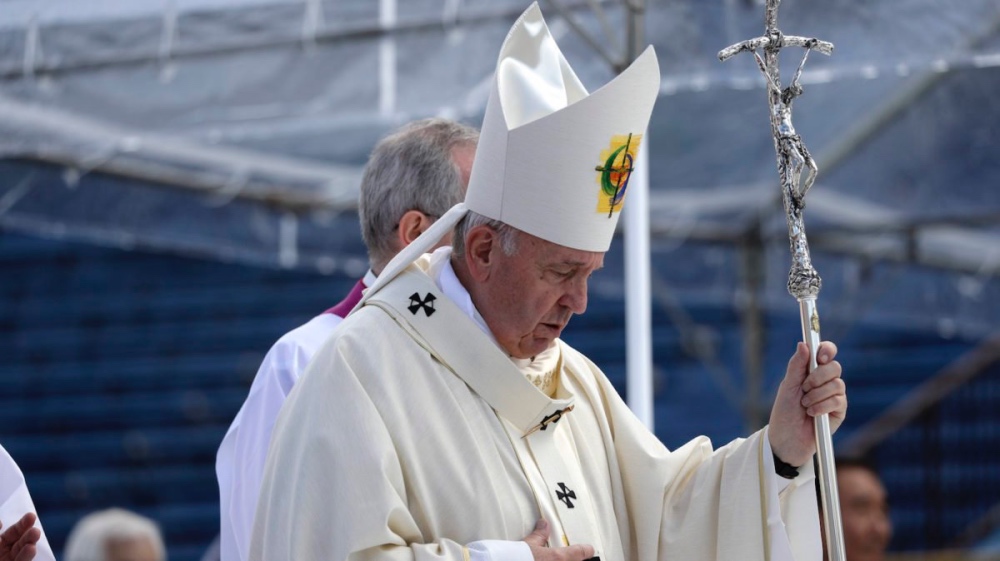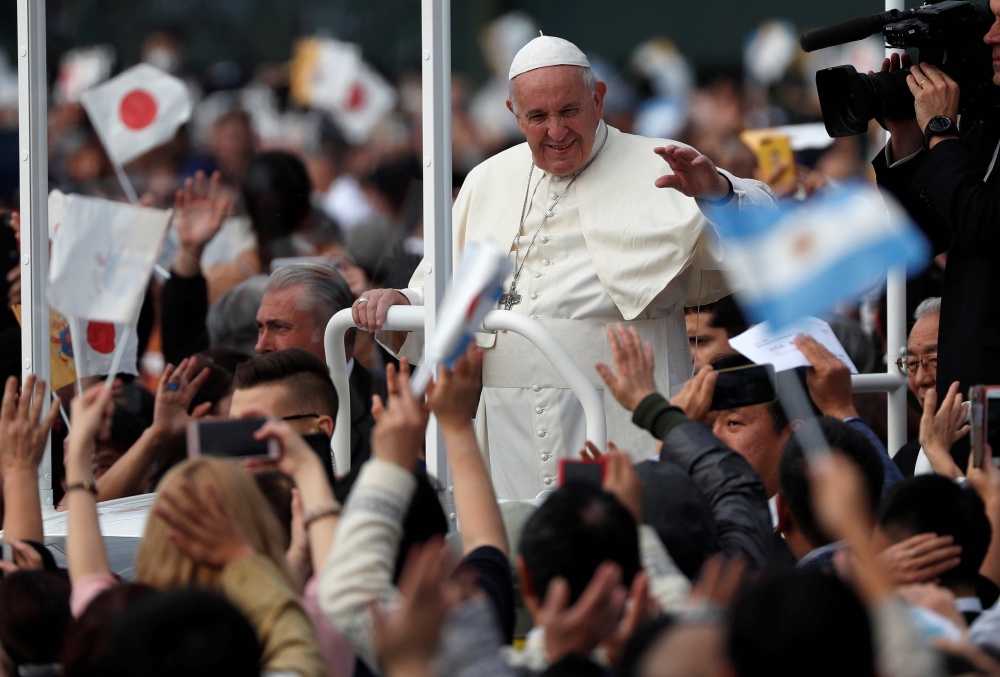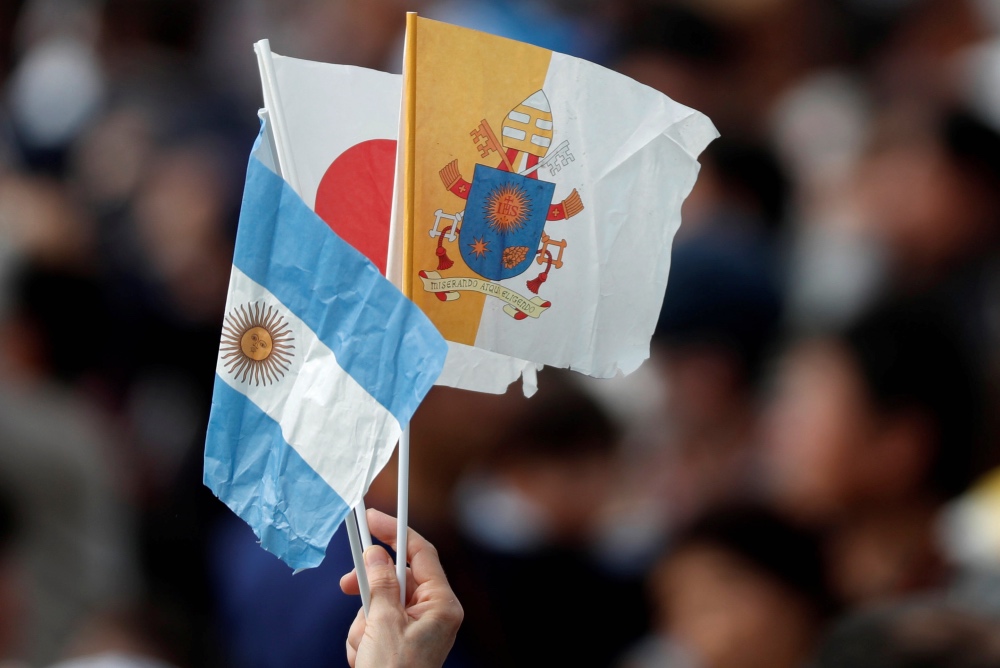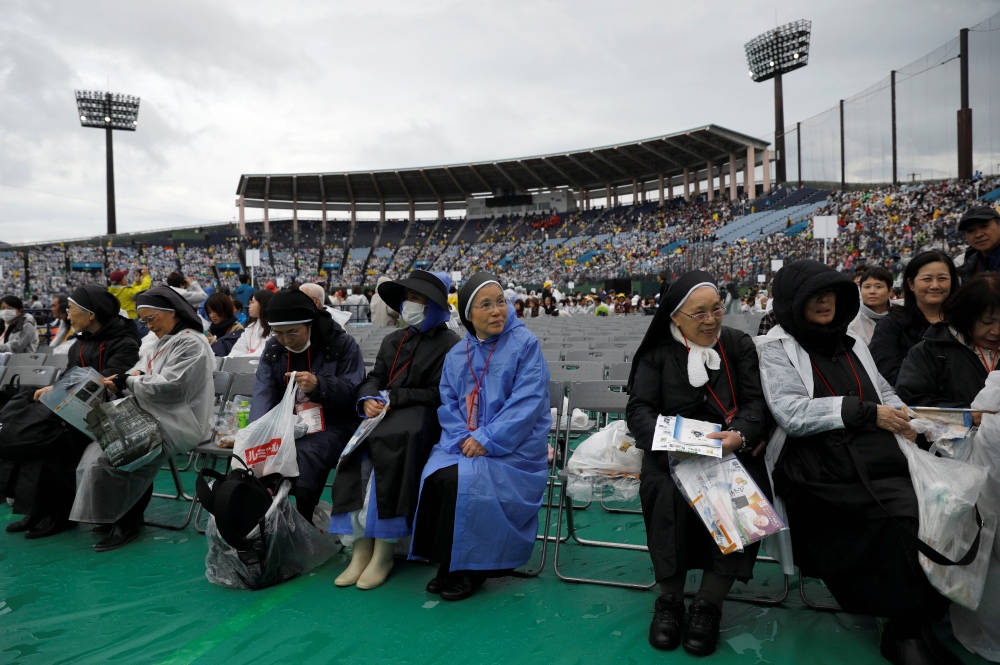
CLAIRE GIANGRAVÉ reports from the papal tour of Japan…
Hiroshima, Japan
RNS
Speaking before survivors of the 1945 bombing of Hiroshima, Pope Francis called nuclear weapons and their possession “immoral” and suggested that countries divert the money they spend on their military to efforts to assist the poor.
“In a single plea to God and to all men and women of good will, on behalf of all the victims of nuclear weapons and experiments, and of all conflicts, let us together cry out: Never again war, never again the clash of arms, never again so much suffering!” the Pope told the crowds gathered at the Hiroshima Peace Memorial.

Pope Francis at the Atomic Bomb Hypocenter Park, on Sunday, in Nagasaki, Japan. PICTURE: AP Photo/Gregorio Borgia.
On Sunday, Pope Francis visited Hiroshima and Nagasaki, two highly anticipated stops in his 23rd to 26th November apostolic visit to Japan after his stop in Thailand. The two cities were decimated atomic bombs dropped by the United States, on 9th August, 1945, forcing Japan to surrender and end World War II.
The United States remains the only nation to use nuclear weapons against another nation.

Pope Francis greets wellwishers during a Holy Mass at Nagasaki Baseball Stadium, in Nagasaki, Japan, on 24th November. PICTURE: Reuters/Issei Kato
JAPANESE CHRISTIANS IN NAGASAKI TEARFUL, EXCITED TO HEAR POPE SPEAK
Nagasaki, Japan
Japanese Christians lined up before dawn on Sunday to get seats at a Mass being said by Pope Francis in Nagasaki, where 27,000 people were killed instantly when the United States dropped a second atomic bomb on Japan, effectively ending World War Two. Nagasaki is also known for its “Hidden Christians”, people who went underground to blend their religion with elements of Buddhism and Japan’s native Shinto rather than give up their religion or be martyred for their faith during the 250 years when Christianity was banned in Japan. Pope John Paul II also visited Nagasaki during his trip to Japan 38 years ago.
Akemi Yamono, 59, teacher
“It’s like a dream, I’m so excited. When I saw TV last night, with hymns playing and Nagasaki scenes shown, I was practically in tears…I was here when the last Pope came as well. I think it’s unbelievable that I’ve been able to see two Popes in my lifetime. It’s like a miracle.”
Chizuko Hisamatsu, 66, housewife
“This is the second time I’ve been able to see a Pope here in Japan, my heart is beating really fast…We can’t have any more atomic bombings. It’d be great if that message would get across to the world. I’d like it if nuclear weapons were eliminated and there wasn’t any more war. I think I may cry.”
Shingo Fukaura, 31, artisanal soap-maker
“I came yesterday at noon to check things out and see when I could start lining up, I came here by 6:00 am. I’m part of a group of Hidden Christians and 38 years ago our representative came to see John Paul II. I’m the seventh generation. He received a rosary. Now we were invited again. Francis has mentioned us several times and seems to acknowledge us. So we’re all really excited by this…This is a camellia sapling. If I can see him, I’d like to have him bless this. Camellias have been an important symbol to us from a long time ago. If he does bless it, I’d like to take it back to my home in the Goto islands and use it as a symbol of peace…I’m very happy with his message. My grandfather and grandmother were in Nagasaki, working in a factory, when the bomb fell. That makes me a third-generation survivor.”
Yasuko Tabana, 82
“This is my last chance to hear the voice of a living Pope and pray with them in the same place…This is the best feeling. I was baptized at 20 but I’d been interested in Catholicism since I was in high school. I had lots of thoughts the way you do when you’re young, but one of them was that atomic weapons aren’t something that are proof of man’s technology but will lead to man’s extinction. I’ve felt a long time that atomic technology is not something humans should continue with so I really agree with the Pope.”
– ELAINE LIES, Reuters
In the evocative setting of Hiroshima’s peace memorial, beneath the Genbaku Dome, the only building in the target zone to survive the explosion, Francis paid tribute not only to his predecessor Saint John Paul II, who delivered a speech against nuclear proliferation during his visit to Japan 38 years ago, but also to Pope Paul VI’s 1965 plea to end war with the phrase “Never Again!”
The Catholic church in Japan has been a consistent voice in opposing the use of nuclear power over the years and every year it promotes 10 days of activities, reflections and prayers for those who died and suffered as a result of the two atomic bombs.
Francis’ visit to the site of the disaster occurred in the late hours of the afternoon, amid an eerie silence among the nearly 30,000 gathered at the memorial. Francis embraced survivors, some of whom wept while remembering the devastating effects that the bomb had on their city and their lives.
In his speech, Francis said that “a true peace can only be an unarmed peace” and that the moral imperatives for the present and future generations are “to remember, to journey together, to protect.” World leaders especially, he said, must ensure to not lose the memory of past mistakes.
The pope urged the global community to eliminate the threat of nuclear weapons even as the world today “faces a climate of distrust,” where the interconnectedness promised by technology is trumped by “an erosion of multilateralism.”
Francis also remembered the suffering and martyrdom of the Catholic community in Japan, many of whom died in the bombing.
About 40,000 people overall, mostly civilians, died immediately from the blast. Many more perished from radiation exposure, with the death toll reaching almost 150,000 people in the months following.
Nagasaki’s Cathedral of the Immaculate Conception, the largest Catholic cathedral in Japan, also known as Urakami for the area of the city that surrounds it, was rebuilt in 1959. It is home to the head of a statue of the Virgin Mary that miraculously survived the atomic explosion.
In Nagasaki, a black marble slab commemorates the many victims of the atomic bomb and over 500 cherry trees line the Nagasaki nuclear memorial park. At the center stands a large statue of man praying for the dead. His hand is aimed at the sky, to warn against the threat of nuclear weapons.
The city of Nagasaki has a long history of Catholicism. In the late 1500s, the city’s Catholic population grew thanks to an influx of Jesuit missionaries mostly from Spain and Portugal. Over time, the number of churches grew so much that Nagasaki earned the nickname “Little Rome.”
In 1587, worried about the growing foreign influence, Japan expelled all missionaries and Catholics were forced to live their faith underground. For centuries afterward, Nagasaki remained a Christian hub where the faith was kept alive, but hidden, from the largely Buddhist and Shinto population.
The city is rich in martyrs who stood by their Catholic faith in the face of persecution. Among them Saint Paul Miki, who, discovered to be a Catholic, was tortured and led to Nagasaki with other 25 young boys and men, to be crucified and pierced with spears.
“Yes, here we see the darkness of death and martyrdom, but also the light of the resurrection, as the blood of the martyrs becomes the seed of the new life that Jesus wishes to bestow on us,” Francis said at the martyrs’ monument.
The pope later said Mass for 40,000 people of different backgrounds and beliefs at the Nagasaki baseball stadium. There he warned against the growing conflicts that divide the world today and continue to threaten the hope for peace.
“Nagasaki bears in its soul a wound difficult to heal, a scar born of the incomprehensible suffering endured by so many innocent victims of wars past and those of the present, when a third World War is being waged piecemeal,” Francis said.
Francis’ speech in Nagaski called for further action and determination for nuclear disarmament by the global community of nations, suggesting that military spending could better benefit the poor and needy.
“Saint Paul VI suggested as much in 1964, when he proposed the establishment of a Global Fund to assist those most impoverished peoples, drawn partially from military expenditures,” Francis said, as heavy rains poured over Nagasaki’s Atomic Hypocenter Park.
After his day trip to the two Japanese cities, the pope returned to Tokyo, where he will spend the two remaining days of his visit. On Monday, he will visit the Japanese emperor and government officials, including Prime Minister Shinzo Abe, whose government has been hoping to invest in nuclear energy.
The Catholic Church, while always decrying the use of weapons of mass destruction, has so far not opposed the use of nuclear energy, despite the dangers to the environment.
But Francis, who has made the protection of the environment a staple of his pontificate, will call attention to the risks of nuclear power when he meets with victims of the 2011 Fukushima disaster, where a powerful earthquake and the subsequent tsunami damaged a nuclear power plant causing numerous casualties.

A flag bearing the coat of arms of Pope Francis flutters along with the Japanese and Argentine flags as wellwishers attend a Holy Mass conducted by Pope Francis at Nagasaki Baseball Stadium, in Nagasaki, Japan, on 24th November. PICTURE: Reuters/Issei Kato
Earlier, during his first day in Japan, the Pope appealed to the country’s Catholic history as an “antidote against despair” in a society faced with high youth suicide rates and an aging population.
“All of us are aware of the grave problems affecting people in your communities whose lives are marked, for various reasons, by loneliness, despair and isolation,” Francis said in a speech to the Japanese episcopacy at the Apostolic Nunciature in Tokyo on Saturday.
The Pope pointed to the “increase in the rates of suicide” and “bullying” as responsible for “new forms of alienation and spiritual disorientation”.
In his speech, the Pope said that he has felt “felt a fondness and affection” for Japan since he was young, when he dreamed of becoming a missionary priest. Today, Francis continued, he comes to the country “as a missionary pilgrim” and to support the small local church in raising its voice “when addressing pressing issues of peace and justice in our world”.
“Try to create spaces in which the culture of efficiency, performance and success can become open to a culture of generosity and selfless love, capable of offering to everyone – not only to those who have ‘made it’ – the possibility of a happy and successful life.”
– Pope Francis, in a speech to the Japanese episcopacy at the Apostolic Nunciature in Tokyo on Saturday
Among the issues facing Japan is the alarming suicide rate, which is so great that it has become a matter of public debate in the country. Starting in the late 1990’s, Japan saw a steep rise in suicide deaths. During its peak in 2003, about 70 people committed suicide every day.
Suicide cases have been steadily declining in the past three to nine years, but certain pockets of the Japanese population remain at risk. More than 300 children, from elementary to high school, committed suicide in 2018, according to research by the Japanese Ministry of Education, Culture, Sports, Science and Technology. Suicide rates have grown 42 percent every year, the same research showed, with the problem plaguing high schoolers most.
The most common causes of suicide, government data shows, tend to be depression, the pressure of family and work life and bullying, but in many cases the factors that lead to suicide remain unknown, challenging doctors and researches looking for solutions.
Francis urged the country’s bishops to cater to young people in particular since they are the most prone to commit suicide and “thirsting for compassion.”
“Try to create spaces in which the culture of efficiency, performance and success can become open to a culture of generosity and selfless love, capable of offering to everyone – not only to those who have ‘made it’ – the possibility of a happy and successful life,” he said.
With their zeal, ideas and energy, young people – when well-formed and accompanied – can be a deep source of hope to their contemporaries and bear vital witness to Christian charity.”

Wellwishers wait for Pope Francis’ arrival for a Holy Mass at Nagasaki Prefectual Baseball Stadium, in Nagasaki, Japan, on 24th November, 2019. PICTURE: Reuters/Issei Kato
The Pope also extended prayers to the victims and survivors of the typhoon that devastated Japan recently, stating that “evil has no preferences, it doesn’t care about people’s background and identities.”
Environmental disasters also have an effect on Japan’s suicide rate. A recent article by the Financial Times showed that employees not working for essential services were forced to go to work after the typhoon, regardless of safety and traffic conditions that paralysed the city.
Many workers who don’t fall victim to karoshi, or death by overwork, contribute to the growing suicide rates, according to a Japanese government white paper calling for action on the issue released on 1st October. In a country in demographic decline, concern about suicide and work-related deaths, especially among young people, have grown of late.
In fewer 30 years, Japan’s population may shrink from 127 million to 100 million, according to the National Institute of Population and Social Security Research. One third of the population is forecast to be elderly by 2036 and many Japanese are so overworked they say they are too busy to find a partner.
The Japanese’ emphasis on working long hours has also made it difficult for Catholic missionaries to make headway.
“People don’t have time to come to church. Here, work gets the priority, not religion,” said Rev Bradly Rozairo, a missionary priest in japan of the Delegation Superior of the Oblates of Mary Immaculate, in an interview with Vatican News on 19th November.
The Catholic Church in Japan has made efforts to speak out on the culture of overwork, and local dioceses offer call centers and meeting points for people who are thinking about committing suicide or are feeling lonely.
“The DNA of your communities is marked by this witness, an antidote against despair, that points out the path they must follow,” Francis told the bishops. “The mission in these lands was marked by a powerful search for inculturation and dialogue, which allowed for the creation of new models, independent of those developed in Europe.”
Even though the local church is very small, he said, its commitment to evangelisation must not diminish and instead should focus on opening a “humble, daily witness and openness to dialogue” with the majority religions, Shintoism and Buddhism.
People in Australia looking for help or information can call Lifeline on 13 11 14 or the SuicideCall Back Service on 1300 659 467.





